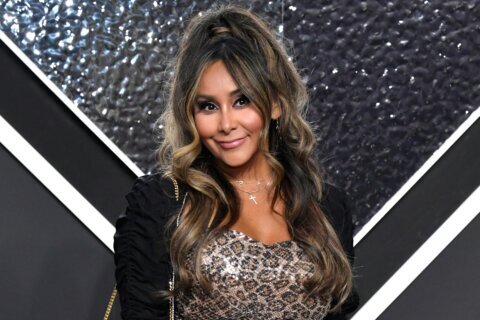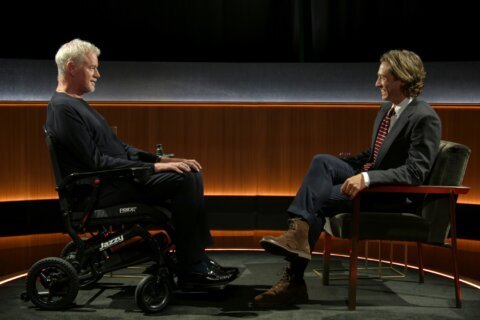WASHINGTON — He made the talkbox famous with live electric shows.
Now, Peter Frampton goes unplugged at the Kennedy Center on Sunday, Oct. 16 at 8 p.m.
“It’s an honor to play there,” Frampton told WTOP. “It’s very stripped down. It’s a bit like storytellers meets unplugged. It’s a combination of the two, really: the stories of how the songs were written, what was going on, what guitars, what tunings. It’s just sort of an evening with me in the living room.”
He’ll be joined on stage by his son Julian Frampton and longtime collaborator Gordon Kennedy.
“It’s an evening with The Framptons,” Frampton said. “My son opens up, and he plays a half-hour with his writing partner, then I come on and do half a dozen songs totally on my own. Then my writing partner Gordon Kennedy comes on with me for the rest of the evening. … Kennedy at Kennedy!”
Music has always been a family affair for Frampton. Born in 1950 in Bromley, London, he discovered his grandfather’s banjolele in the attic at age 7 and taught himself to play like his favorite artists.
“[I loved] Buddy Holly,” Frampton said. “The English Shadows who backed up Cliff Richard, they are my English influences. Hank Marvin, the lead guitarist of that band, was the one that had the first 1958 Stratocaster in England. All up-and-coming guitarists were drooling every time he was on TV.”
His parents also introduced him to their favorite artist: jazz pioneer Django Reinhardt.
“I hated that when I first heard it when I was like 7 years old. … ‘Dad’s listening to that silent movie music again,'” Frampton joked. “But I’m still studying him today, and up until I kick the bucket, I’ll still be cursing at Django Reinhardt for being that good. He’s an inspiration. A lifelong inspiration.”
All the while, his father Owen Frampton ran the art department at Bromley Technical High School, where he taught the late great David Bowie, who then went by his birth name David Robert Jones.
“Dave was in my dad’s art class for four years, so I knew of him before I went to the school,” Frampton said. “I was like 3 years younger, so when I did go to the school, I had already seen him play around town in a couple of bands, one being The Conrads. … I said, ‘Dad is there anyone in school that’s into rock ‘n roll?’ He said, ‘Yeah, Jones I think is into it. Look him up.’ So I did. … I made a B-line to Dave.”
Soon, Frampton and Bowie began jamming together at school events.
“We used to jam on the art stairs during lunch,” Frampton said. “We would take our guitars to school and my dad would hide them in his office. … My dad put on an end-of-term concert for the school. … It was a variety show and I got to play guitar with … my own Little Ravens, which was me on guitar, a friend on piano and a bass player but we had no drummer. Dave’s band, George & The Dragons … had a drummer and no bass player! So we swapped. They were the headliners and we were the support.”
After the Little Ravens and its successor, the True Beats, Frampton joined a band at age 14 called The Preachers, produced and managed by Bill Wyman, who would become the famed bassist for The Rolling Stones. At age 16, band members from The Herd came to Frampton and asked him to join.
“I had to ask my father, a teacher, ‘Can I drop out and join a rock ‘n roll band?’ Mom had to do some serious calming down! I don’t think my dad wanted me to join a rock ‘n roll band, but in the end, he let me. So I got into The Herd and within a year, we were on top of the pop [charts] making hit records.”
Worrying the group was “too poppy,” Frampton began jamming with Steve Marriott and Ronnie Lane of The Small Faces — the three ultimately spinning off into their own British rock group Humble Pie.
“That was so many lessons rolled into one,” Frampton said. “Being around talent like Steve Marriott, he was a special character. There’s not too many people who have that much talent in one person. So I learned an incredible amount of stage presence, singing, approach to guitar. … They got me playing a lyrical, bluesy-jazz style and Steve more heavy-rock blues, so we put that together and it became very fiery musically. That’s when I started realizing that I was creating my own style of guitar playing.”
So, after four studio albums and one live album with Humble Pie, Frampton went solo in 1971 with his debut album, “Wind of Change” (1972), featuring guest artists like Ringo Starr and Billy Preston.
“I was just doing what I do, I didn’t really think about it too much,” Frampton said. “Just going out and doing what Humble Pie had done, which was record an album, go out and play on the bill in as big an environment [as possible] and open up for an arena act so you grab their audience. … I would come off the road after a tour and write and record another album, then go back and tour worldwide.”
Frampton cranked out three more studio albums, “Frampton’s Camel” (1973), “Something’s Happening” (1974) and “Frampton” (1975), before combining them into his ultimate masterpiece.
“Those four studio albums, plus ‘Shine On’ from Humble Pie, was six years’ worth of material that I chose the best of to be the stage set that night in 1975, when we recorded ‘Frampton Comes Alive’.”
Recorded over four live shows between June 16 to Nov. 22 in California and New York, “Frampton Comes Alive” made rock history. The double-live album topped the Billboard album charts in the U.S. and Canada and was voted Album of the Year in a readers’ poll by Rolling Stone magazine. It spawned radio hits like “Show Me the Way” and “Baby, I Love Your Way” — which he wrote on the same day.
“It was in Nassau, Bahamas, I borrowed Steve Marriott’s cottage on the beach. I locked myself away there for three weeks and after two weeks I had nothing that I was very proud of,” Frampton said. “So I woke up that first day of the last week and said I better get my act together, picked up the guitar and wrote ‘Show Me the Way’ in the morning. I thought, ‘This is the first thing I feel is halfway decent.'”
Feeling in the groove, Frampton let the creative juices flow.
“I had lunch, had a swim, took in some sun and thought, ‘Let’s try this again, I may be on a hot streak,'” Frampton said. “So I sat outside as the sun was setting and wrote, ‘Shadows grow so long before my eyes and they’re moving across my page.’ That was ‘Baby I Love Your Way.’ That’s a good writing day!”
The “Frampton Comes Alive” album also produced a third smash hit in “Do You Feel Like We Do.”
“I would bring my reel-to-reel and stick a couple of mics up and record the rehearsals,” Frampton said. “The band said, ‘Wind it back about three minutes ’cause there was a lick that you played, Peter, that I think we might want to jam on some more. We wound it back and there it was: the intro to ‘Do You Feel.’ … It’s the only song I’ve ever written about a hangover, and I guess it hit a nerve with people.”
Why did he echo the famous “do you” chorus line with another emphatic “you?”
“It’s just the way the chords went,” Frampton admitted. “I could have sung a different word, but it seemed like a good idea. Repetition is good in songs!”
Once again, the double-live album concept was an idea he got from his days in Humble Pie, which similarly cut four studio albums before recording a live album using many of those same songs.
“The response live was greater than the record sales, so we thought we’d give them what they want, and it worked,” Frampton said. “The rest is history. That’s just one of those nights you get where the whole band comes off and says, ‘Wow, I had a really good night. It was one of my better nights.’ It was the perfect night. … You usually go, ‘Wow, I wish we had recorded that,’ and we went, ‘We did!'”
The live album became famous for Frampton’s use of the talkbox, an effects unit allowing singers to manually modify their voices. Frampton says he’ll never forget the first time he saw the device.
“The thing was invented in the 1940s, a very crude version of it, then Pete Drake, the pedal-steel player that I met on the ‘All Things Must Pass’ sessions in London … Pete Drake got out this talkbox and plugged things into things and put a pipe in his mouth and the pedal steel started singing to me. That’s when my jaw dropped. I said, ‘Where’d you get that? I need one.’ He said, ‘I made it myself.'”
Drake loaned that exact talkbox to Joe Walsh for his hit song “Rocky Mountain Way” (1973), inspiring Frampton to use the talkbox on “Do You Feel” while touring as an opening act for Walsh in 1974.
“The talkbox has an incestuous history,” Frampton joked. “But it’s something that’s very simple, not expensive, but it’s a very powerful communication tool. Now, everybody’s thinks it’s a talkbox, but it’s autotune. But there’s still something very analog, the talkbox, and it’s very human-sounding.”
If you doubt Frampton’s legacy, look no further than all the autotune songs on the radio today. Although, Frampton fans will no doubt prefer the human, analog sound he helped to pioneer. Either way, don’t expect to hear the talkbox at the Kennedy Center. This show is zero electric, all acoustic.
“You get a whole other side,” Frampton said. “It’s something very different for me and the audience. I’ve had people come to both types of shows [saying], ‘We’ve been watching you for years and years and we love the band, but this is something totally different, and we think we like it even better.'”
Click here for ticket information. Listen to the full conversation with Peter Frampton below:








